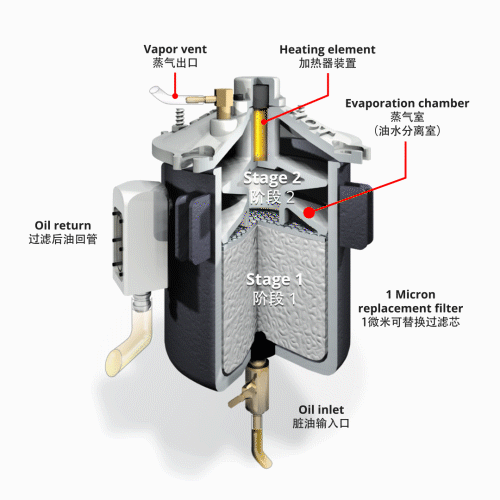How does GLW systems help in
Reducing cost
In today’s environment conscious society and depleting fossil fuel, new oil purchase and waste oil disposal has become increasingly onerous and costly.
GLW Systems are able to extend the oil change intervals by removing the solid, liquid and gaseous contaminants from the oil. Whilst keeping the oil clean during operations, GLW Systems also help to reduce engine and system wear, thus reducing maintenance cost significantly.
How exactly does
Our technology work
GLW systems clean the contaminated oil in 2 stages.
Stage 1: The contaminated oil passes through our replaceable filter medium, made of long-strand unbleached cotton, capable of removing solid contaminants larger than 1 micron in size.
Stage 2: The oil then passes through a heated evaporating chamber, where the liquid and gaseous contaminants are evaporated and immediately vented out via the vapour valve. By removing the contaminants like water and sulphur dioxide from the oil, we can thus prevent the formation of acids in the oil.
After the cleaning stages, the clean oil returns to the engine reservoir (sump) by gravity.
Benefits of GLW bypass oil filtration systems
By keeping the oil continuously clean during operations, we can effectively achieve the following.
Significantly reduces operational expenses by
- Greatly extending oil change intervals
- Significantly reducing new oil purchases
- Increasing engine efficiency, thereby improving fuel consumption
- Reducing down-time, thereby improving bottom line profits
Significantly reduces capital expenditure by
- Extending engine and equipment lifespan
- Offering a rapid payback period
Significantly contributes to the environment conservation by
- Reducing environmental pollution by decreasing waste storage and disposal.
- Minimizing the chance of accidental spillage
Significantly reduces maintenance costs by
- Removing sludge that wears engine and equipment parts
- Preventing the formation of acids which corrode engine and equipment parts
- Removing fuel dilution
- Preventing the formation of water-oil emulsion
- Reducing waste oil handling and disposal costs


